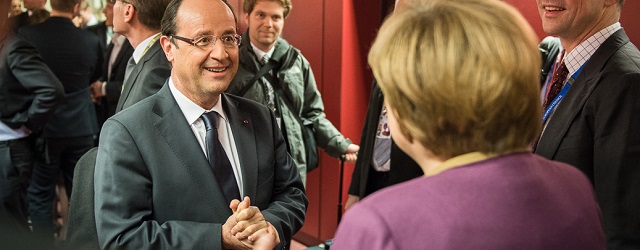François Hollande’s presidency enters its second year next Wednesday, May 15. But he has by now already seen many of his policies fail either because they were impracticable or because Germany’s pressure has proved too strong for France to fight back with some degree of success. While the European economy shrinks, the French leader is struggling to find its voice and come out from behind the shadow of German Chancellor Angela Merkel.
Hollande seeks co-operation instead of a clash of arguments with Germany. On May 8, while in Poland, the French president said that European nations have learnt to reconcile their differences and it is time for everyone to agree “in favour of a Europe of economic growth and jobs,” which can only be achieved if “Germany and France work together.”
Not all French socialists feel so generous. Claude Bartolone, president of the National Assembly, has asked the government to battle Berlin. In a recent document for members of the party, the attitude of the German government was described as “selfish intransigence”. The language used in this paper was so strident that Laurent Fabius, minister of Foreign Affairs, had to reprimand his colleagues: “It’s legitimate to discuss with our neighbour, but it is not to blame Germany’s head of state for our lack of competitiveness and our own economic troubles.”
The retort came from the Bundesbank. Its governor, Jens Weidman, told regional newspaper WAZ that promises and writing of new rules mean very little when there’s no will to deliver. “France will miss its initial deficit target this year, and it may even increase in 2014,” Weidman said, “too bad for a country that should give others example.”
French Finance minister Pierre Moscovici, though, thinks the country would not recover if it had to meet the target with higher budget cuts. Thierry Repentin, the French minister for European Affairs, has explained that the Hollande government “refutes austerity policies because France’s needs are different.”
Brussels and Berlin have let France, and other states like Spain, take more time to trim their public deficits. Probably, Germany fears a league of contrarian countries could derail Berlin’s plans of a fiscal union under tight spending and finance limits. Merkel wants the German electorate to know the she still is in control of the situation, a condition for her to be re-elected next September now that voter support has split between her party and the ecologist left–41 percent each, according to the latest polls.
The French government is leading two pro-growth initiatives. One is the EU’s €120 billion investment programme for 2014-2020. The second is domestic, the Pact for Industry Competitiveness of Louis Gallois, Investment commissioner–and admission that France has lost some 750,000 jobs in the manufacturing sector and there was a €70 billion trade deficit two years ago.
But what about reforms? France hasn’t tackled its labour market as hard as it should have, and lags now behind Spain. Hollande says he will only introduced changes when there is a social consensus. Meanwhile, his deficit reduction turns out to be a mere tax rise. It’s no wonder that Berlin is not amused.






Be the first to comment on "Berlin grows impacient with François Hollande’s presidency"